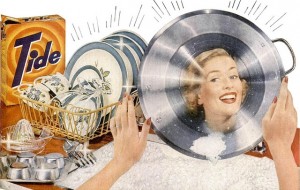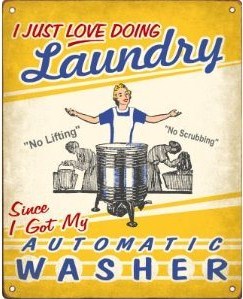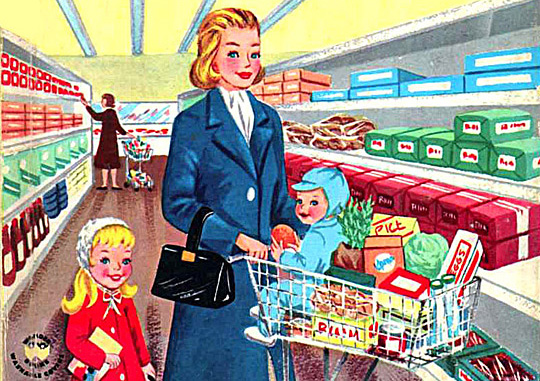
Automatic dishwashers used to clean dishes just fine, no pre-washing needed. Scrape, don’t wash, was the motto we all lived by for years. Then around 2012 the dishes began coming out dirty. At first I thought it was my dishwasher getting old and tired, so I replaced it. When that didn’t help I changed detergent brands, several times. Eventually I was forced to concede that dishwashers don’t work so well anymore and I simply needed to wash them by hand before I let the machine have a turn. I know, it’s stupid to wash the dishes before washing the dishes. What’s the point of having this machine!?
Big Brother Meddles Again
One day I was fed up having to wash my dishes twice and asked Google to show me the answers. As is often the case, it was the government’s fault. In 2011 the bureaucratic busybodies in the Washington decided that the active ingredient in dishwashing detergent should be banned. Their reasoning was that the phosphorus might get into the lakes and streams, and once there it might make the algae grow “too much”. You might be asking yourself, “Why would my sewage be getting into the lakes and streams in the first place,” and that would be a great question. Rather than answering that riddle, the government simply banned phosphorus from dish and laundry soap.
Phosphorus Sounds Like a Really Dangerous Chemical
Phosphorus is a nutrient vital to human, animal, and plant life. It is one of the most common substances in our environment, naturally occurring in our food, our water and our bodies. In your body, phosphorus is present in your genes, your teeth, and your bones — even your muscles work because of the phosphorus in adenosine triphosphate. Phosphorus is used in baking, as a polishing agent in toothpaste, is added to salt to keep it flowing freely, and is used in soda pop to give it a tart flavor. Its also excellent at cleaning dirt because the phosphates envelopes the dirt particles and holds it suspension in the water, and gets rinsed away.
But Nature Is Totally Worth It
I want to reiterate the point that phosphorus is not some horrid chemical that kills nature, it’s natural and makes plants grow really well. Its a common ingredient in our food; Cheerios for example. Its safe for kids, but bad for the environment? It gets better. When the government studied the matter they found that the consumer phosphates were not even getting into the waterways, but rather it was runoff from farm fertilizers that was. The government ban on consumer detergents was completely reactionary and not based on reality. It gets better still. When the University of Washington studied the matter further, it was found that the phosphates used in consumer products are not able to be used by algae. So even if the dishwasher phosphates were to get into lakes and rivers, which it wasn’t, it still couldn’t cause algae blooms. Not done yet. Without the cleaning power of phosphates, the detergent manufacturers had to replace it with something else, and those alternatives are petroleum-based chemicals and unnatural enzymes which are far more harmful to the environment.
Fear Not, There is a Solution
 Now you know why your dishwasher began sucking at its job a few years ago,but there’s good news. While the government was meddling with our dishwashers on their errant mission to solve a non-existent problem by making it worse, it turns out that commercial businesses (restaurants, hotels) still have to get their dishes clean, so they were exempted from the ban. Isn’t that nice of Big Brother (sarcastic). Cascade Professional makes a line of dish detergent which you can order on Amazon or pick up from a restaurant supply shop. If the package says that it contains “phosphates” then you’re in good shape. Also, a product called Bubble Bandit contains phosphorus and does a proper job.
Now you know why your dishwasher began sucking at its job a few years ago,but there’s good news. While the government was meddling with our dishwashers on their errant mission to solve a non-existent problem by making it worse, it turns out that commercial businesses (restaurants, hotels) still have to get their dishes clean, so they were exempted from the ban. Isn’t that nice of Big Brother (sarcastic). Cascade Professional makes a line of dish detergent which you can order on Amazon or pick up from a restaurant supply shop. If the package says that it contains “phosphates” then you’re in good shape. Also, a product called Bubble Bandit contains phosphorus and does a proper job.
The best and most inexpensive solution is to simply add phosphates to your dishwasher. A 4.5 pound box of TSP (trisodium phosphate) is less than $10 and will last for months. A half-teaspoon of TSP added to your dishwasher, along with your regular dishwasher liquid, will get the job done for pennies per load. Note: it’s suggested that TSP be used in conjunction with a soap of some kind, so TSP won’t entirely replace your existing detergent. While TSP is quite safe and is not an acid, appropriate care and storage should still be used; in other words don’t eat it, don’t put it in your eyes, and don’t let children play with it.
Laundry Too!
The same story applies to your laundry as to your dishwasher. For front-loading washers, add one tablespoon TSP along with your normal laundry soap. For heavily soiled or large loads, you can add as much as ¼ cup of TSP. For top-load washers you may need more as they use much more water than the HE front-load washers, so start with ¼ cup and move up to as much as ½ cup. TSP is perfectly safe for all colors and whites, and can be safely mixed with bleach if needed.
Now your dishes and clothes will be clean again. And nature won’t be harmed at all so you can sleep well at night.
TSP Quick Reference
Dishwasher: ¼ teaspoon, along with normal dish detergent
Front-load washer: 1 tablespoon to ¼ cup, along with normal laundry soap
Top-load washer: ¼ cup to ½ cup, along with normal laundry soap
Additional reading links:
New York Times
NPR
Weekly Standard
Red State
Disclaimer: this article may contain affiliate links.

